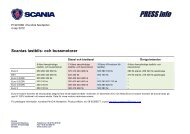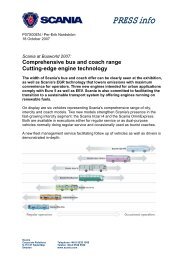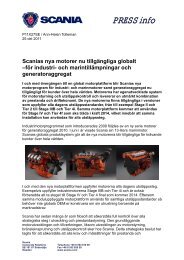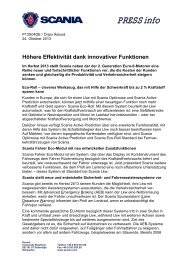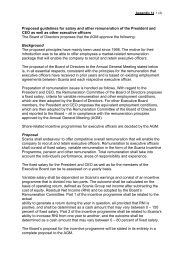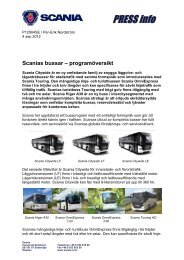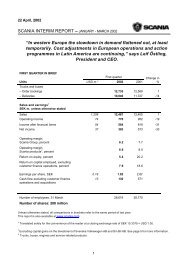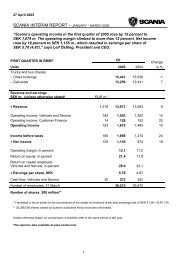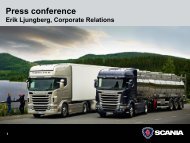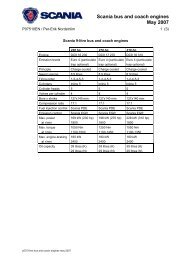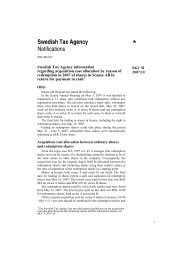Scania Annual Report 2011
Scania Annual Report 2011
Scania Annual Report 2011
Create successful ePaper yourself
Turn your PDF publications into a flip-book with our unique Google optimized e-Paper software.
46 SCANIA’S SUSTAINABILITY WORK<br />
Key role for sustainable transport solutions<br />
Efficient cargo transport and human mobility are fundamental for positive social development.<br />
<strong>Scania</strong> is strongly committed to the task of building a transport system that will be<br />
sustainable in the long term. The company plays a key role in this task together with its<br />
customers, transport service buyers and other actors.<br />
<strong>Scania</strong>’s vision is that the carbon dioxide emissions<br />
related to the completion of a given transport task shall<br />
be halved by 2020 compared to 2000. To achieve this<br />
vision, <strong>Scania</strong> works with technological development,<br />
driver training and streamlining of transport service<br />
planning.<br />
<strong>Scania</strong> also advocates forward-looking transport<br />
policies and legislation that underpin the sustainable<br />
development of transport systems.<br />
Making passenger transport more efficient<br />
In and around the world’s growing major cities, traffic<br />
jams and limited accessibility are major problems that<br />
require good public transport systems to resolve.<br />
Safe, efficient and accessible public transport<br />
systems help reduce environmental impact and simplify<br />
daily life for everyone. Shifting passenger transport from<br />
cars to buses in urban areas has major environmental<br />
advantages by greatly reducing both congestion and<br />
emissions. The use of renewable fuels can further lower<br />
environmental impact.<br />
Together with its partners, <strong>Scania</strong> helps develop<br />
modern, efficient, attractive and environmentally optimised<br />
bus systems. They consist of comfortable buses<br />
that use dedicated lanes and enjoy priority over other<br />
traffic. These bus systems provide good information<br />
about routes and timetables. They allow boarding and<br />
disembarkation at specially adapted station platforms.<br />
Efficient bus systems are also a good way of creating<br />
attractive, safe commuting options that passengers can<br />
afford, thereby achieving greater mobility. This, in turn,<br />
promotes both economic and social development.<br />
Making goods transport service more efficient<br />
A substantial increase in transport services can occur<br />
with unchanged environmental impact if vehicles and<br />
existing infrastructure are used more systematically.<br />
Major environmental gains can be achieved by improving<br />
logistics systems for goods transport.<br />
<strong>Scania</strong> also supports allowing longer, more efficient<br />
vehicle combinations. In this way, it would be possible<br />
to increase the cargo capacity of each vehicle by 50<br />
percent, thereby reducing environmental impact –<br />
measured per tonne of goods transported – and also<br />
reducing transport costs.<br />
Less energy consumption, better road safety<br />
<strong>Scania</strong> shall offer its customers vehicles with high safety<br />
standards and the best possible operating economy<br />
throughout the product life cycle.<br />
<strong>Scania</strong> develops vehicles with the aim of avoiding<br />
accidents and reducing injuries when accidents<br />
nevertheless occur. The development of services and<br />
products that help drivers make the right decisions is<br />
another important component.<br />
The driver plays a key role in reducing energy consumption<br />
and environmental impact. <strong>Scania</strong> has<br />
offered driver training to its customers for a long time.<br />
By using a good driving style, drivers can reduce<br />
their fuel consumption by around 10 percent, thereby<br />
lowering transport costs.<br />
There is also increased awareness that good environmental<br />
performance reduces costs and strengthens a<br />
haulage company’s profitability. Today the cost of fuel<br />
accounts for about one third of a long-haulage company’s<br />
transport costs in Europe and is also considerable<br />
for other truck and bus companies. Continuously<br />
reducing fuel consumption and emissions is thus a<br />
central element of new product and service development<br />
efforts.<br />
A free choice between fuels<br />
Biofuels are crucial for further reducing carbon dioxide<br />
emissions from heavy vehicles. For <strong>Scania</strong>, biofuels that<br />
meet agreed sustainability criteria are an important element<br />
in efforts to reduce the impact of transport on the<br />
climate. As the standards for reducing carbon dioxide<br />
emissions become tougher and the price of fossil fuels<br />
increases, both the supply and demand for renewable<br />
fuels will rise. All <strong>Scania</strong> vehicles can run on biodiesel,<br />
and <strong>Scania</strong> also supplies trucks and buses that are<br />
specially adapted for bioethanol and biogas. All commercially<br />
available biofuels can thus be used in <strong>Scania</strong><br />
vehicles.<br />
<strong>Report</strong> of the directors <strong>Scania</strong> <strong>2011</strong>



